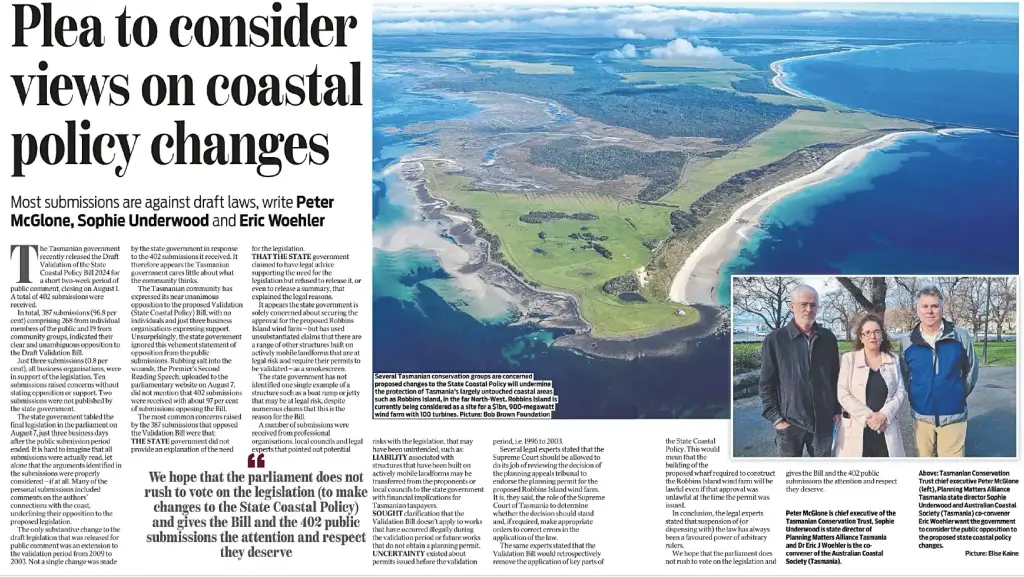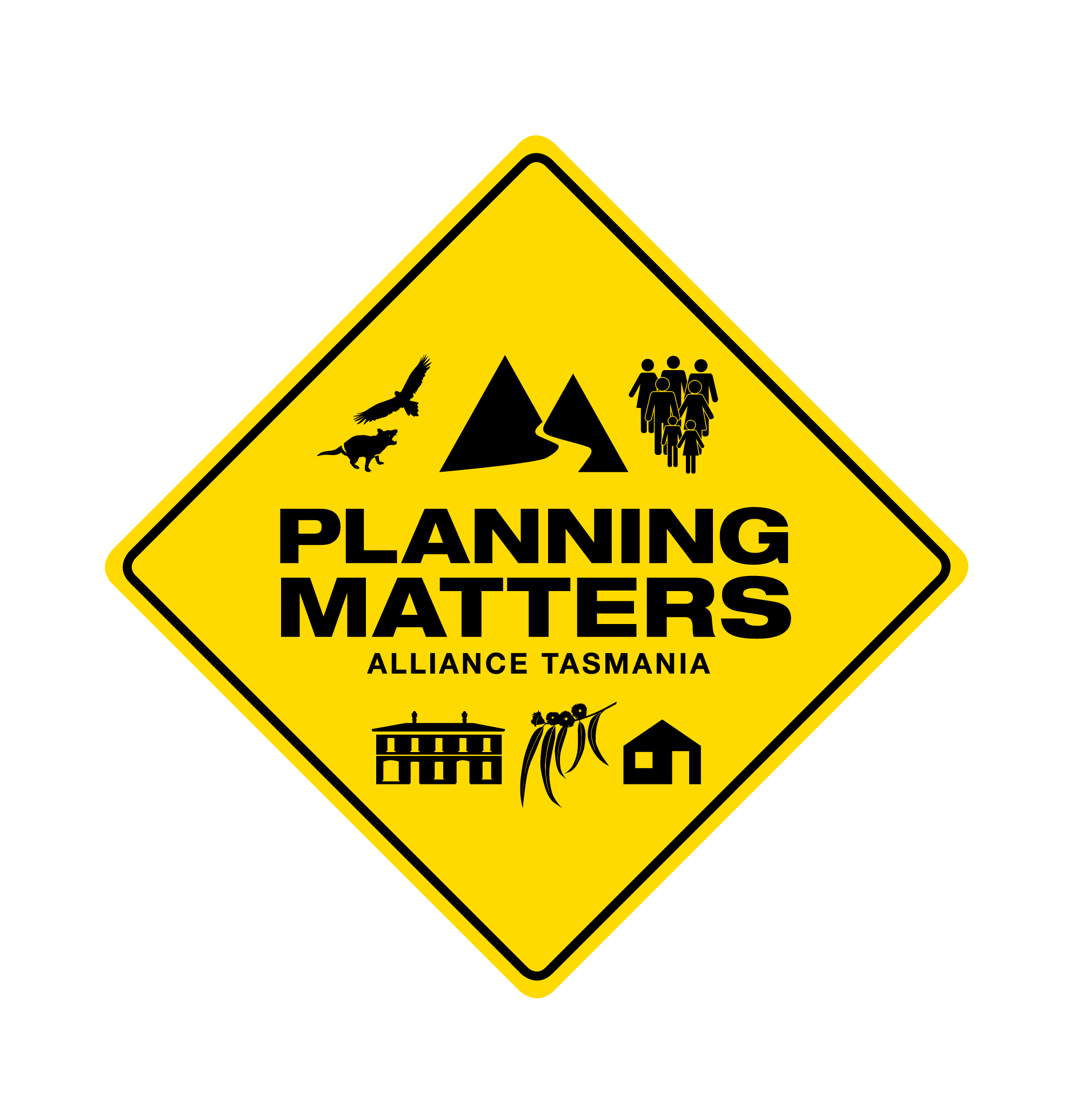- Opinion Piece
Mercury Opinion Piece: Plea to consider view on coastal policy changes
Media Enquiries
Sophie Underwood
PMAT State Director
sophie_underwood@hotmail.com
0407 501 999
Please share:
“Plea to consider view on Coastal Policy Changes” Published in The Mercury 18 September 2024.
The Tasmanian government recently released the Draft Validation of the State Coastal Policy Bill 2024 for a short two-week period of public comment, closing on August 1. A total of 402 submissions were received.
In total, 387 submissions (96.8 per cent) comprising of 268 from individual members of the public and 19 from community groups, indicated their clear and unambiguous opposition to the Draft Validation Bill.
Just three submissions (0.8 per cent), all business organisations, were in support of the legislation. Ten submissions raised concerns without stating opposition or support. Two submissions were not published by the state government.
The state government tabled the final legislation in the parliament on August 7, just three business days after the public submission period ended. It is hard to imagine that all submissions were actually read, let alone that the arguments identified in the submissions were properly considered – if at all. Many of the personal submissions included comments on the authors’ connections with the coast, underlining their opposition to the proposed legislation.
The only substantive change to the draft legislation that was released for public comment was an extension to the validation period from 2009 to 2003. Not a single change was made by the state government in response to the 402 submissions it received. It therefore appears the Tasmanian government cares little about what the community thinks.
The Tasmanian community has expressed its near unanimous opposition to the proposed Validation (State Coastal Policy) Bill, with no individuals and just three business organisations expressing support. Unsurprisingly, the state government ignored this vehement statement of opposition from the public submissions. Rubbing salt into the wounds, the Premier’s Second Reading Speech, uploaded to the parliamentary website on August 7, did not mention that 402 submissions were received with about 97 per cent of submissions opposing the Bill.
The most common concerns raised by the 387 submissions that opposed the Validation Bill were that:
THE STATE government did not provide an explanation of the need for the legislation.
THAT THE STATE government claimed to have legal advice supporting the need for the legislation but refused to release it, or even to release a summary, that explained the legal reasons.
It appears the state government is solely concerned about securing the approval for the proposed Robbins Island (pilitika) wind farm – but has used unsubstantiated claims that there are a range of other structures built on actively mobile landforms that are at legal risk and require permits to be validated – as a smokescreen.
The state government has not identified one single example of a structure such as a boat ramp or jetty that may be at legal risk, despite the numerous claims that this is the reason for the Bill.
A number of submissions were received from professional organisations, local councils and legal experts that pointed out potential risk with the legislation, that may have unintended, such as:
LIABILITY associated with structures that have been built on actively mobile landforms may be transferred from the proponents or local councils to the state government with financial implications for Tasmanian taxpayers.
SOUGHT clarification that the Validation Bill doesn’t apply to works that have occurred illegally during the validation period or future works that do not obtain a planning permit.
UNCERTAINTY exited about permits issued before the validation period, i.e. 1996 to 2003.
Several legal experts stated that the Supreme Court should be allowed to do its job of reviewing the decision of the planning appeals tribunal to endorse the planning permit for the proposed Robbins Island / pilitika wind farm. It is, they said, the role of the Supreme Court of Tasmania to determine whether the decision should stand and, if required, make appropriate orders to correct errors in the application of the law.
The same experts stated the Validation Bill would retrospectively remove the application of key parts of the State Coastal Policy. This would mean that the building of the proposed wharf required to construct the Robbins Island / pilitika wind farm will be lawful even if that approval was unlawful at the time the permit was issued.
In conclusion, the legal experts stated that suspension of (or dispensing with) the law has always been a favoured power of arbitrary rules.
We hope that the parliament does not rush to vote on the legislation and gives the Bill and the 402 public submissions the attention and respect they deserve.
Peter McGlone is chief executive of the Tasmanian Conservation Trust, Sophie Underwood is state director of Planning Matters Alliance and Dr Eric J Woehler is the co-convenor of the Australian Coastal Society (Tasmania).

Related News & Media

Background Report & Joint Media Releases: Scrap proposed legislation to weaken State Coastal Policy
PMAT, and other Tasmanian conservation organisations, are calling on the State Government to halt plans to retrospectively amend the Tasmanian State Coastal Policy, commit to

Joint Media Release: State Government must scrap its proposed legislation to weaken the Tasmanian Coastal Policy
Tasmanian conservation organisations repeat their call for the State Government to scrap their retrospective legislation to amend the Tasmanian State Coastal Policy, commit to not

Mercury Opinion Piece: “Cease bids to interfere with coastal policies”
“If there are genuine concerns about the state’s coastal policy, then let’s follow an informed consultative process, not rush through retrospective legislation with minimal opportunities

Joint Media Release: State Government must not legislate to kill ongoing court case over Robbins Island wind farm
PMAT, and other Tasmanian conservation organisations, are calling on the State Government to halt plans to retrospectively amend the Tasmanian State Coastal Policy, commit to

Support Us
Receive News & Updates from PMAT
Stay informed on what’s happening locally and statewide within Tasmania, and join our community in advocating to protect Tasmania’s future.